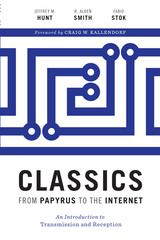
Winner, PROSE Award, Classics, Association of American Publishers (AAP), 2018
Writing down the epic tales of the Trojan War and the wanderings of Odysseus in texts that became the Iliad and the Odyssey was a defining moment in the intellectual history of the West, a moment from which many current conventions and attitudes toward books can be traced. But how did texts originally written on papyrus in perhaps the eighth century BC survive across nearly three millennia, so that today people can read them electronically on a smartphone?
Classics from Papyrus to the Internet provides a fresh, authoritative overview of the transmission and reception of classical texts from antiquity to the present. The authors begin with a discussion of ancient literacy, book production, papyrology, epigraphy, and scholarship, and then examine how classical texts were transmitted from the medieval period through the Renaissance and the Enlightenment to the modern era. They also address the question of reception, looking at how succeeding generations responded to classical texts, preserving some but not others. This sheds light on the origins of numerous scholarly disciplines that continue to shape our understanding of the past, as well as the determined effort required to keep the literary tradition alive. As a resource for students and scholars in fields such as classics, medieval studies, comparative literature, paleography, papyrology, and Egyptology, Classics from Papyrus to the Internet presents and discusses the major reference works and online professional tools for studying literary transmission.

The disciplines now known as the humanities emerged in their modern form during the Italian Renaissance as the result of an educational movement begun by humanist teachers, writers, and scholars in the early fourteenth century. These educators argued for the usefulness of classical literature as an instrument for training young men and women, not only in the arts of language and eloquence, but also in civic virtue and practical wisdom.
This volume provides new translations, commissioned for the I Tatti Renaissance Library, of four of the most important theoretical statements that emerged from the early humanists’ efforts to reform medieval education: Pier Paolo Vergerio, “The Character and Studies Befitting a Free-Born Youth”; Leonardo Bruni, “The Study of Literature”; Aeneas Silvius Piccolomini (Pope Pius II), “The Education of Boys”; and Battista Guarino, “A Program of Teaching and Learning.”
The original text of these four documents with Craig W. Kallendorf’s translation is also available in a facing-page edition.

The cycle of disciplines now known as the humanities emerged in their modern form during the Italian Renaissance as the result of an educational movement begun by humanist teachers, writers, and scholars of the early Quattrocento. The movement argued for the usefulness of classical literature as an instrument for training young men and women, not only in the arts of language and eloquence, but also in civic virtue and practical wisdom. This volume contains four of the most important theoretical statements that emerged from the early humanists’ efforts to reform medieval education.
The four texts are Pier Paolo Vergerio, “The Character and Studies Befitting a Free-Born Youth”; Leonardo Bruni, “The Study of Literature”; Aeneas Silvius Piccolomini (Pope Pius II), “The Education of Boys”; and Battista Guarino, “A Program of Teaching and Learning.” The Vergerio and Guarino texts appear in English for the first time.
READERS
Browse our collection.
PUBLISHERS
See BiblioVault's publisher services.
STUDENT SERVICES
Files for college accessibility offices.
UChicago Accessibility Resources
home | accessibility | search | about | contact us
BiblioVault ® 2001 - 2024
The University of Chicago Press









